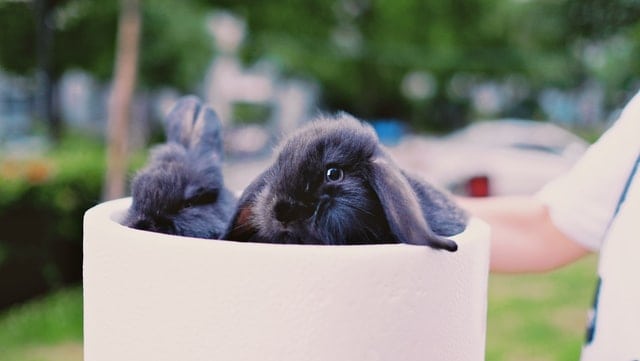
In this post we will talk about the care after sterilizing a dwarf rabbit. I will also leave you some guidelines on Pre – Operative care that I consider of vital importance.
Spaying rabbits is recommended to prevent them from becoming aggressive and overly stressed with the need for breeding. In the case of female rabbits, it also helps to avoid diseases such as tumors or cysts.
Pre-operative care
Those of us who have rabbits at home know how delicate they are and how quickly their health progresses both for better and for worse. That is why we must have a certain knowledge of what the Pre and Post-operative Cares are in a rabbit to be able to treat it as best we can and know.
- Go to a rabbit specialist veterinarian.
- Ask veterinarian what type of anesthesia he plans to use. Some injectable anesthetics can cause paralysis if mismanaged.
- Schedule the operation so that you can take your rabbit home the same day. Spending the night in a strange place, surrounded by unfamiliar people and sounds can add unnecessary stress.
- It is not recommended more than hours of fasting. The intestine of a healthy rabbit is never empty, and it shouldn’t be. Rabbits can suffer liver damage when the intestine is empty for a relatively short time, so fasting before the operation is not recommended. In addition, if we fast for only 2 hours before the operation, we will help the intestinal tract to remain active, which speeds up recovery.
Care after sterilizing a dwarf rabbit
In a rabbit neuter operation, recovery is fairly quick and usually without complications; males 1 or 2 days, and females a little longer, 3-4 days. During this time, it is normal for them to be sleepy, in appetent and somewhat sore, especially females, since in these the operation is more complex.
- After the intervention, it is essential that the rabbit eat again as soon as possible. As soon as it is recovered, they will tell us to offer them fibrous food (hay) and water, and if after a few hours it has refused any food, we will have to “force” them to take something with a syringe. Sometimes baby jars of fruit are useful if there is no possibility of giving something else.
- It is very important that the rabbit remains in a quiet and safe place for them since when they wake up from the anesthesia they can be a bit clumsy and injure themselves. A bed, a cage or your own carrier are ideal places.
- You should monitor your stool and urine to check that your body is working well after the operation.
- The incision can become infected, bruise, or bleed. If we see something strange it is important to take it to the vet as soon as possible.
- We must avoid excess light and noise in recovery, and avoid drafts that cool the place.
- Rabbits, like their herbivorous colleagues, horses, do not tolerate pain well, so they will prescribe a pain reliever for a few days after surgery. It is usually given by mouth, it is difficult to mix a medicine with hay.
- If it have not eaten anything in the 24 hours following the operation, we will urgently go to the vet .






